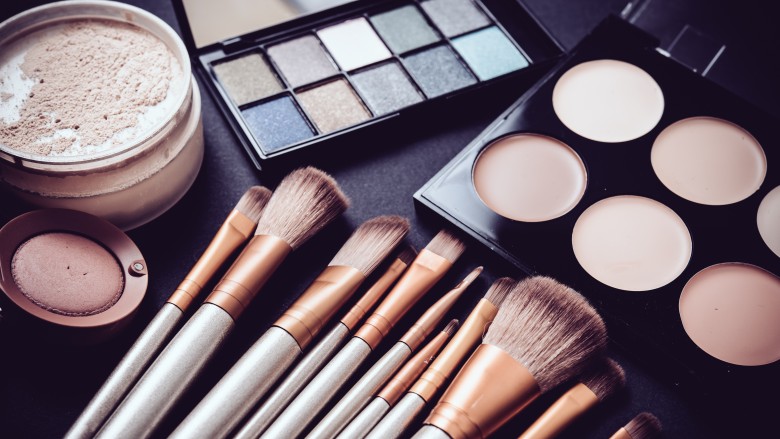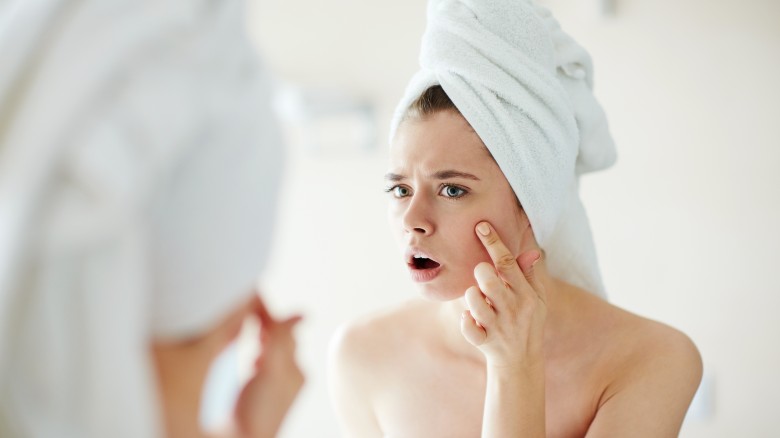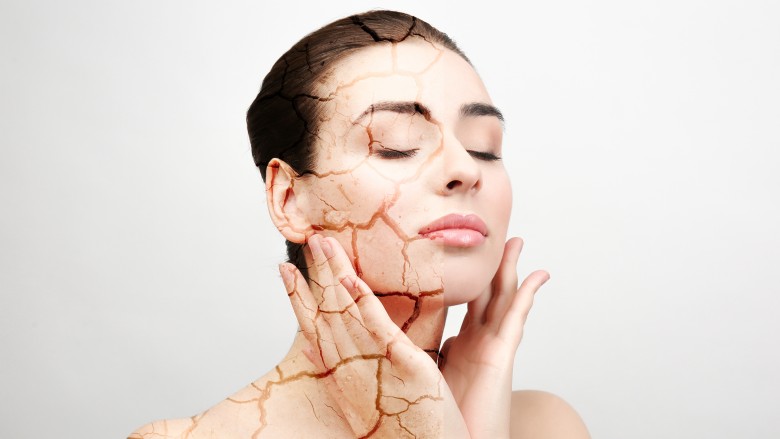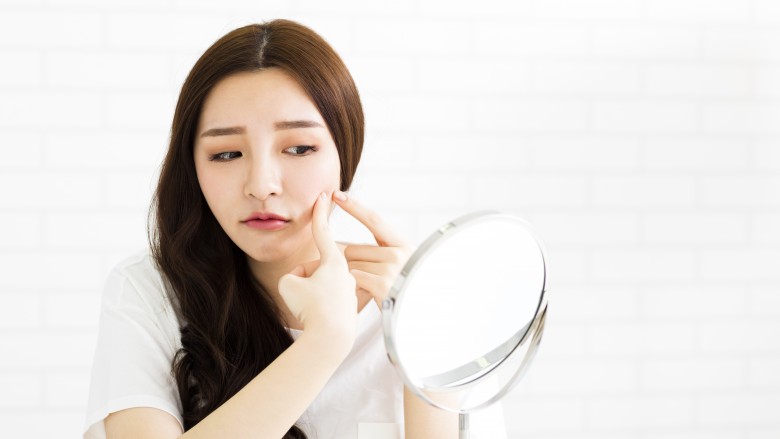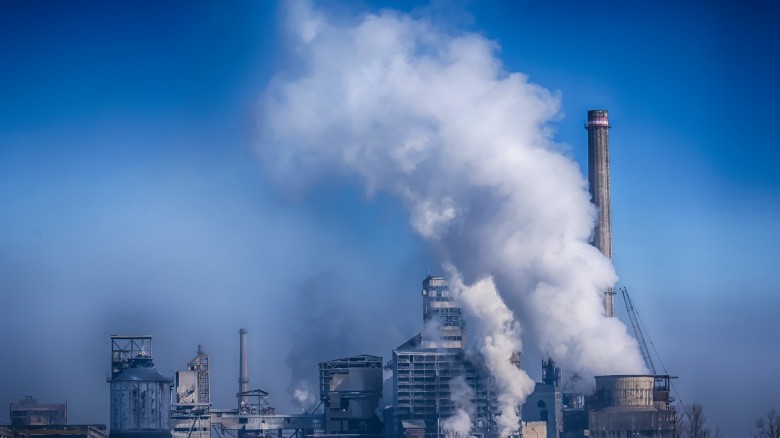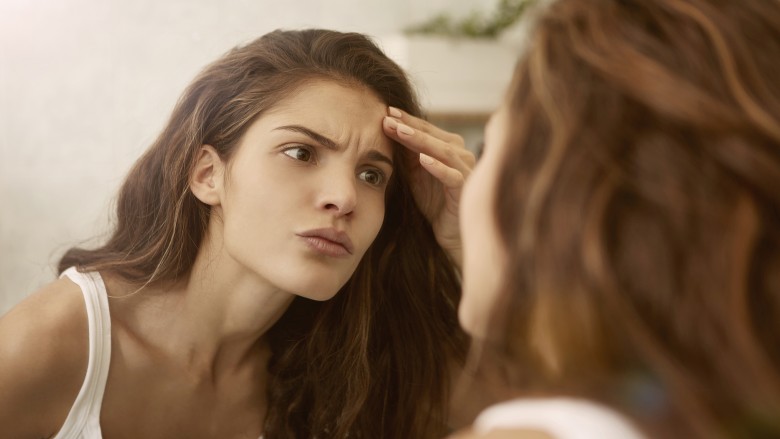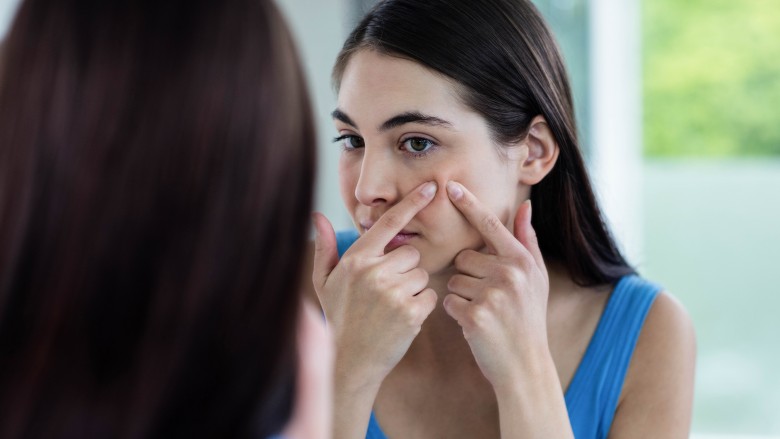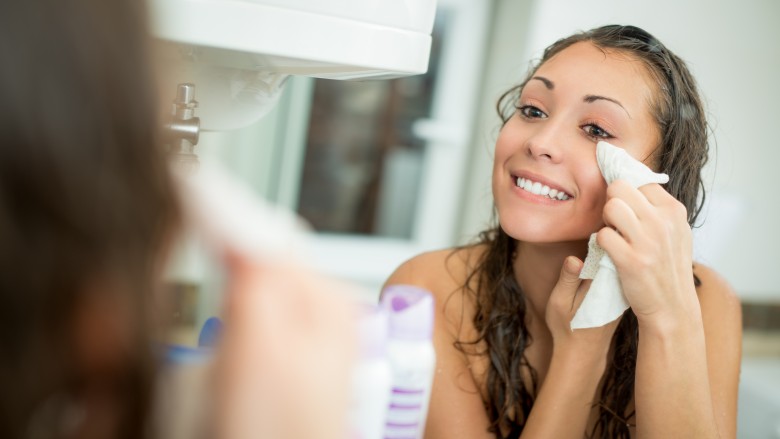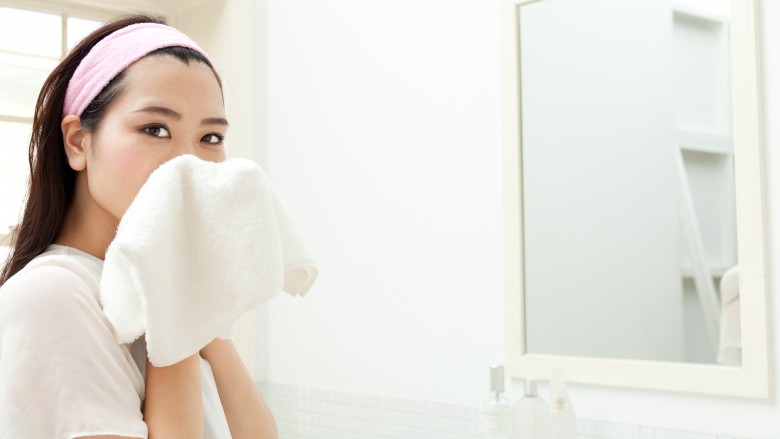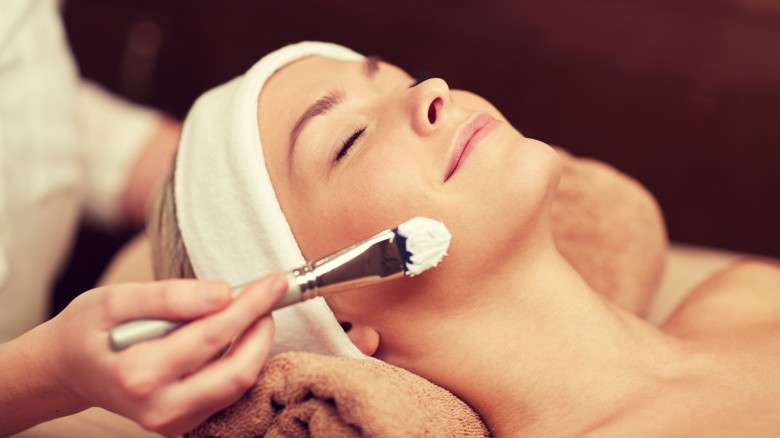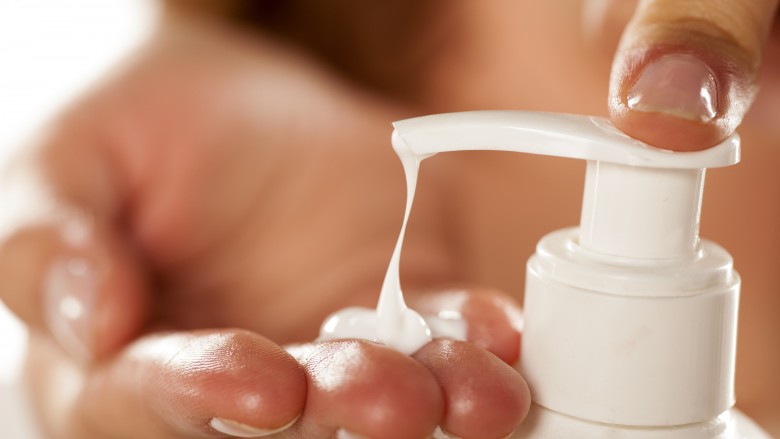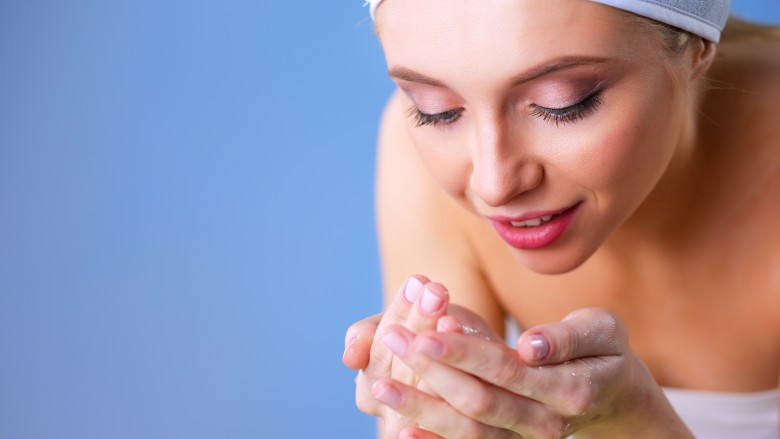What Really Happens To Your Face When You Sleep In Makeup
Let's be honest. We've all done it. You get home late, watch a little TV, then climb into bed. The last thing you feel like doing is crawling out of your warm sheets to go wash your face. What's the worst that could happen? Well, if you do it once in a while, it's probably not a big deal. However, don't make it a habit.
"Sleeping in makeup is one of the worst things you can do to your skin," Dr. Stefani Kappel, board certified dermatologist and fellowship-trained MOHS surgeon, told me. "It is important to wash your face before bed no matter how dead tired you are."
Sleep is a crucial time for our bodies to rest and replenish. Your muscles need to recover from the day, but so does your face.
"Your skin recharges from the things it endured during the day as you are sleeping. It is in repair mode in preparation for the day ahead," Tiffany Crews, licensed master aesthetician with Virginia Dermatology & Skin Cancer Center, told me. "When you sleep in your makeup, it conflicts the skin repair process." Here are just some of the downsides to passing out in your mascara.
Your body will absorb your makeup
While many of us take our skin for granted, it's important to remember that it is an organ, just like our heart or lungs. It's also our largest organ, so it some tender love and care. Our skin is always absorbing what we put on it, so sleeping in our makeup means we're absorbing whatever chemicals are in those products.
"If you sleep in your makeup, the natural oils that come out at night will absorb any product that's on your skin," Shara Strand, skin expert and makeup artist in the Pierre Hotel, told me. "When oils mix with your makeup at a rapid rate, it will cause blemishes to appear. They may take days to weeks to disappear."
Our skin is a serious organ, so covering it with a foreign substance all of the time is not a good plan. "Just like our internal organs, our skin is always at work," Beverly Hills celebrity dermatologist Dr. Harold Lancer told me. "Skin is made up of water, protein (like collagen, which gives your skin strength and structure), lipids, and different minerals and chemicals. Skin is also covered in pores, which allow us to sweat and secrete sebum, a natural lubricant that moisturizes skin and removes dead skin cells and other irritants from our pores."
So when we sleep in our makeup, we block those little pores. When our pores can't do their job of secreting serum, the problems start.
Say hello to acne
While our skin is busy absorbing that day-old makeup all night, it's also preparing to launch an acne attack.
"When you fall asleep with makeup on, the skin sebum secretion, dead cells, and makeup debris block pores overnight, allowing bacteria to brew acne, aggravate rosacea, and cause sallow, uneven, blotchy skin," Dr. Sonam Yadav, cosmetic dermatologist and medical director of Juverne, told me.
And it happens to the best of us, even those who know better! Makeup artist and beauty blogger Hillary Kline told me that even she's dealt with acne after too many nights of skipping the face wash. "This has actually happened to me when I haven't taken off my makeup," she told me. "If you're not removing your foundation, it can lead to clogged pores and pimples." Take it from an expert. Clean off that foundation every night.
Your skin could dry out
Because sleeping in makeup prevents our skin from repairing itself every night, the result is often dull skin lacking that youthful glow that we're all after.
"Going to bed with makeup on will leave you with clogged pores and bumpy dull skin," assistant professor of dermatology at Icahn School of Medicine at Mount Sinai Dr. Debra Jaliman M.D. told me. "This can lead to breakouts if you're acne prone. If you're prone to dry skin it can leave dry patches, especially around the nose and eyebrows."
If you already have dry skin, you're probably hesitant to wash too much. However, washing your face at night with a gentle cleanser is still necessary. "If you have dry, flaky skin use a hydrating cream or serum with hyaluronic acid," recommends Dr. Jaliman.
You may notice white bumps
Have you ever gotten those tiny white dots on your face? Your makeup could be to blame.
"You can also end up with milia on the face, they are especially common around the eyes," explains Dr. Jaliman. "These are tiny white cysts."
These tiny white cysts may seem like no big deal, but they're not going to go away on their own.
"If you develop milia then you need to see a dermatologist to have them removed," Dr. Jaliman said. "This can be done with an electric needle and then extracted." Yikes! I'd rather wash my face, thank you very much.
Your face will absorb pollution
As you walk around during the day, your face is exposed to a lot. All of these chemicals and pollutants are absorbed by our skin. "Over the course of the day, our faces are exposed to dirt, bacteria, smoke, fumes, and environmental pollutants," Dr. Faiyaaz Kalimullah, MD, cosmetic dermatologist at the Center for Dermatology and Aesthetic Medicine in Chicago, told me. "Makeup essentially forms a film that traps and holds all of these pollutants on our skin, which long term can lead to free radical damage and collagen breakdown." So the longer we wear our makeup, like by sleeping in it, the longer our skin is exposed to these damaging substances. Give your skin a break, and cleanse away all the garbage it's exposed to all day.
You'll get more wrinkles
As if sealing pollutants into your face wasn't gross enough, get ready for this. Those pollutants are making you look older! Sleep is the magical process that repairs our skin and systems. However, if your makeup is blocking that restoration from happening, you're going to look older in the morning.
"When you sleep the body recuperates, relaxes and all the anti-aging processes happen," Dr. Yelena Yeretsky, an internationally renowned physician specializing in anti-aging and aesthetic medicine and founder of Clinique YFT, told me. "When it comes to anti-aging, every cell in the body is programmed to work a certain way. So when something like makeups stresses our skin, the process slows down."
Give your skin the best chance it has to look younger on its own by washing each night. It truly makes a difference.
"Sleeping in makeup covers and congests our pores," explains Dr. Yeretsky. "And are you ready for this? It doesn't allow cell turnover to happen. If it does, it happens very slowly. So yes, you are aging yourself every time you sleep in makeup!"
Tiffany Crews agrees. "When your makeup is not washed off, those pollutants and free radicals are left on your skin to cause further damage to your skin as you sleep, resulting in premature aging of your skin," she said. "It's like going to bed with a film of toxins on your face, which suffocates the skin and leads to a rapid aging outcome."
I recently had an anti-aging facial that was meant to remove those damaging free radicals and restore my skin to health. I have been a big makeup-sleeping offender, and the facial made a huge difference in my skin's complexion. You could also try some over-the-counter creams. "If you develop fine lines from pollution, then choose a serum or cream with antioxidants like resveratrol," explains Dr. Jaliman. "You can also use peptides or retinol."
You'll be at risk for inflammation
Part of the problem with leaving your makeup on all night is its ingredients. If your makeup contains chemicals that you're not familiar with, don't smear it all over your body's largest organ 24 hours per day.
"Your skin is subject to inflammation, rashes, and infection if you leave your makeup on all night long," says Hillary Kline. "More times than not, many products have perfumes or dyes in them so that can cause skin irritation."
And it's not just the makeup. As we're exposed to chemicals throughout the day, our makeup works hard to seal in those damaging elements.
"Natural environmental pollutants like pollen, mold, and spores can cause skin irritation," board certified dermatologist Dr. Daniel Ladd told me. "Chemical pollutants like automotive exhaust can actually create free radicals and inflammation that can promote premature aging and wrinkling of the skin." The only way to remove these irritants is to wash your face with a gentle cleanser every night.
Maybe it's not so bad
Now that I've officially scared you into washing your face every hour on the hour, take a deep breath. Not all dermatologists believe sleeping in your makeup is such a big deal.
"Most women think terrible things will happen to their skin by not taking off their makeup before bed, and the reality is, it's usually not much of a problem," Dr. Neal Schultz, New York City dermatologist, host of DermTV.com, and creator of BeautyRx by Dr. Schultz, told me. "Think about it this way: What's the difference between wearing the makeup on your skin for the eight hours that you're sleeping as opposed to the 12 hours that you wear it when you get up in the morning at 8:00 and take it off when you get home at 8:00 at night?" Moral of the story? If you slept in your makeup last night, don't sweat it. But you should probably wash your face tonight.
A lazy girl's plan
Most of us probably plan to wash our faces at night. Of course we don't want premature wrinkles from caked-on pollutants, but once 10 p.m. rolls around and you're exhausted from the day, face washing doesn't sound so important. If you've been too lazy in the past, make a game plan now.
"Too tired or too lazy to make a trip to the bathroom sink and wash your face?" asks Hillary Kline. "I like to buy makeup wipe removing cloths from the drugstore to remove any makeup residue."
Dr. Yeretsky agrees with planning ahead. "The best thing to do is create rituals," she says. "Daily, simple skincare rituals that you are actually going to complete with pleasure and purpose. Find skincare products you enjoy and actually want to use."
How to bounce back
So if you're sitting here thinking, "Oh no, I've seriously damaged my face from never washing," don't despair. Sure, it's important to start washing nightly, but there are some other things you can do to help your skin get back to glowing and gorgeous.
"The best remedy is to cleanse well when you realize this has happened and to stay hydrated [by] drinking plenty water," says Dr. Sonam Yadav. "Use scent-free soothing moisturizer and pop a vitamin C pill to offset some of the antioxidant damage."
Shara Strand agrees that while we can't totally undo the effects of sleeping in makeup, there are still strategies to help our skin recover.
"There's really no guaranteed way to reverse the effects of sleeping in your makeup," cautions Strand. "But a good cleaning, as in a facial, would be helpful. Even exfoliating in the morning and hydrating with lots of oil-free moisturizer and eye cream would help." Try skipping your makeup routine the following day to allow your skin to breathe.
Replace those antioxidants
Once you've exfoliated, add nutrients back to your sin with some gentle products.
"If you do fall asleep with your makeup on, be sure to wash your face thoroughly with a gentle cleanser in the morning. If you find your skin is breaking out, using a medicated cleanser with salicylic acid or benzoyl peroxide can help unclog your pores and reduce acne-causing bacteria," says Dr. Kalimullah. "Applying a good antioxidant serum (containing vitamin C, vitamin E, retinol, resveratrol, or green tea extract) can help prevent additional free-radical damage from UV radiation and environmental pollutants."
You could also try a gentle cleanser that removes some of that dirt and oil.
"If you have slept with your makeup, in the morning you must start with a cleansing with micellar water," Savana Urban Spa dermatologist Dr. Kathy Taghipour recommended to me. "After that, apply a hydrating mask because during the night the makeup will surely dehydrate your skin."
Micellar water is water with small balls of oil in it meant to draw away dirt and oil.
Always moisturize after cleansing
Wearing makeup 24/7 is stressful for your skin, so once you start washing again, don't forget to add back some moisture with a gentle cream or lotion.
"You can undo the damage that has been done if you currently sleep in your makeup by using an alcohol-free makeup remover or wipes to remove makeup," says Tiffany Crews. "Then be sure to double cleanse the skin with a pH balanced cleanser to ensure that all the makeup has been thoroughly removed [and] apply a vitamin A product such as a retinol or Retin A to repair the skin texture, unclog pores, and reduce signs of aging. Then follow suit with hydrating serum or moisturizer containing hyaluronic acid to restore the skin."
Crews recommends the Alchemy Aesthetic Institute Moisture Surge Hyaluronic Acid Serum by Virginia Dermatology for a gentle, hydrating product. According to her, it's like a drink of water for your skin!
"If you are wearing makeup on the heavier side, you should double cleanse before going to sleep," recommends Dr. Yeretsky. "But if you have dry skin, you should not. The dryer your skin, the less water you should put on your face. Make sure to completely rid your face of makeup before going to bed."
Do I still need to wash if I don't wear makeup?
Now all of the crunchy ladies are probably sitting here thinking they're in good shape, face wash or no face wash. If you don't wear makeup everyday, there's nothing to wash off, right? Not so much.
"Having a dirty, sweaty face in general is bad policy," board certified dermatologist Dr. H.L. Greenberg, M.D. explained to me. "It's always best to wash your face at the end of the day and then to apply an anti-aging product and then a good moisturizer before going to sleep. Dirty faces may be a good place for bacteria to look for a home."
Makeup or not, our skin is exposed to a lot during the day.
When it doubt, wash it out
So it turns out that washing your face every night is pretty important. Not only does it prevent acne and premature aging, it saves your body from absorbing some nasty pollutants.
"If you park your clean car outside and wipe your finger over the windshield the next day, you will see the same debris that accumulates on the skin during the day," explains Dr. Kappel. "This can clog pores, cause acne, and age the skin." Treat your skin better than your car and wash up tonight!

